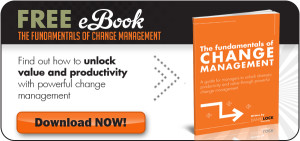Monday, December 22, 2014


Next year is shaping up to be one of enormous economic challenge. Organisational change will become a focus as companies battle to remain competitive. With this in mind, I thought I’d look forward to 2015 with a few suggestions for change leaders who want to make 2015 their year. I’m not talking about the usual resolutions of losing weight, getting fit, or quitting smoking or drinking. These four New Year’s resolutions will ensure the change manager’s team will remain focussed on personal and business goals throughout the next 12 months.
Set clear targets for all
Begin the year with a team meeting where you set out the business plan for the next 12 months. Make targets clear and achievable. For example, within accounts a target may be ‘to reduce invoice payment times from 31 days to 21 days’. Task teams with finding solutions to these problems, and require them to work with others. Then set monthly meetings where progress is reviewed.
Having set team targets, think about individuals: what CPD could they be doing to enhance their own career paths?
Delegate and feedback
Effective change leaders delegate tasks and objectives. Consider what can be delegated out to team leaders and supervisors, and what support they will need as organisational change beds in. Delegation achieves several important goals of management, including:
- It affords the manager more time for big picture strategic planning
- It increases effectiveness of junior management
- It increases engagement in organisational change goals
When delegating, consider who will be best in what role. Placing the right people in the right positions will ensure the best pay-off.
Just as you have timetabled team meetings, ensure you do the same with individuals. Encourage them to be open by being approachable on an ongoing basis. Feedback should be a two-way street: find out what is going well and what is going badly, and applaud and share successes with the team. Where junior managers are failing, act quickly to correct behaviours.
Ensure your team use their time effectively
During team meetings discuss ideas and prioritise the best. Having set your goals for the coming year, make sure that team members work toward these goals by concentrating on tasks and problems that will move organisational change forward.
On a professional basis, there are several things that managers can do to ensure their teams prosper through periods of organisational change.
Shape your team and execute excellence in recruitment
Change leaders – indeed, managers at all levels – often believe they are locked into the team they have been given. Remember that your team will decide your future. If part of the business plan is to, say, provide a new service facility for clients (something your company has never offered previously), then you have two options to achieve this:
- Promote and train your highest achievers
- Recruit externally
Management energy should be directed at ensuring your team is capable of meeting strategic ambitions. This means you will need to make tough decisions and take tough actions.
Remember, too, that retaining the best staff will have a direct impact on your performance. Be specific about what efforts are needed to keep your best people. Feedback sessions can be used to determine their individual aims and how they fit in with team ambitions. Consider their long-term career goals, and make sure you build a plan for them as individuals. Such staff retention strategies cannot be achieved as a cover-all plan: different people will have different goals, ambitions, and capacities.
What applies to your people, applies to you, too
An effective change leader will apply a range of management techniques within their sphere of responsibility. Leading your people within self-improvement and career progression will draw you closer to them. Understanding what motivates your team members is a powerful tool for a change leader, but it is equally as necessary to understand your own motivations.
Seek feedback on your performance, and perform a regular SWOT analysis. Construct your own CPD plan to strengthen in areas of weakness, and concentrate your daily routine where you are strongest. Manage your time effectively, delegating in areas of weakness and taking time to assess and evaluate solutions put forward by team members.
With clear goals for your team, individuals, and yourself, there is no reason why 2015 should not be the year where all expectations are exceeded.
Have you any New Year’s resolutions that I’ve not mentioned? How do you propose to meet your change objectives in 2015?

